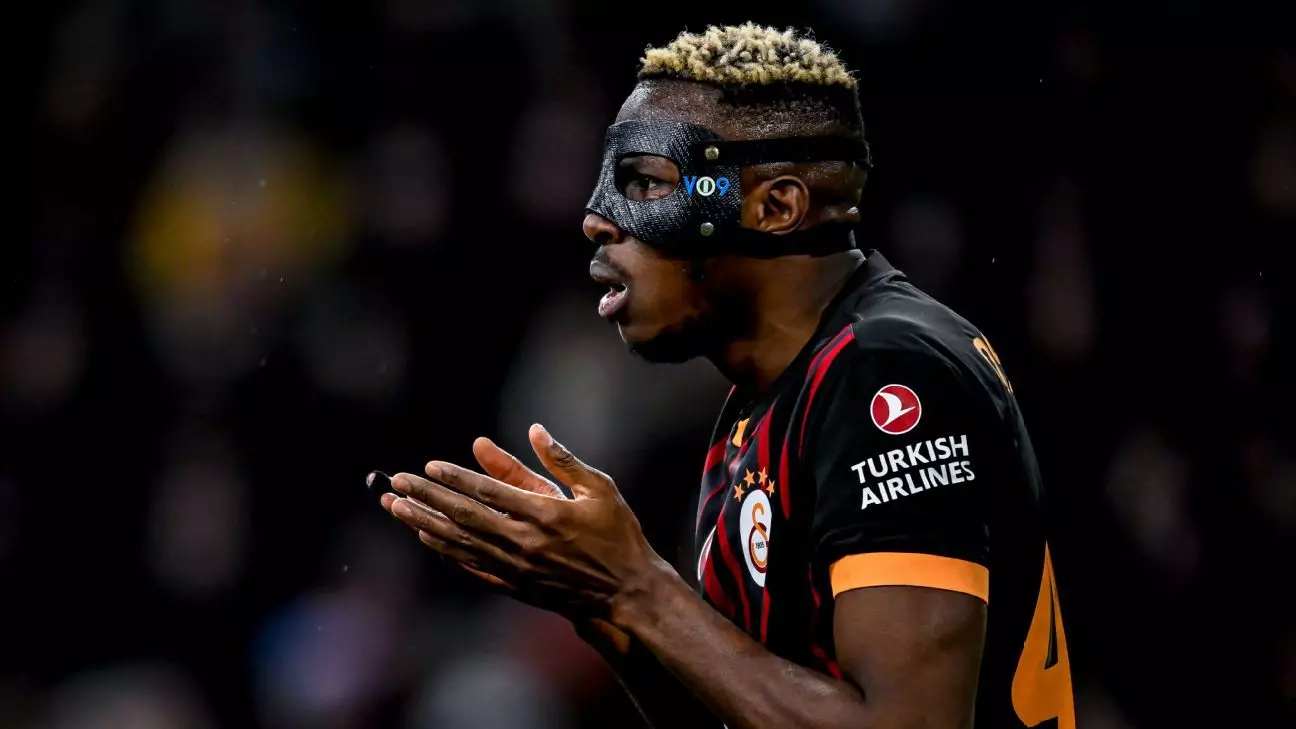January’s transfer window often ignites dreams of dramatic transfers and new beginnings for players. In Nigeria, excitement was palpable this time around, particularly concerning Victor Osimhen and Victor Boniface—two of the nation’s brightest talents. Fans and analysts anticipated significant moves allying these stars with some of football’s heavyweights, but the reality proved to be less sensational. A closer examination reveals not only the missed opportunities for these players but also the shifting dynamics of football economics and career navigation in the current market landscape.
Victor Osimhen’s journey has been a blend of remarkable achievements and crushing disappointments. Following a stellar loan performance at Galatasaray, expectations soared for his permanent move or a high-stakes transfer to a more prominent European club. His scintillating form in Turkey—showcased by 16 goals and 6 assists—made him a coveted prospect among heavyweights like Manchester United and Chelsea. However, the scenario quickly shifted as Napoli’s 75 million Euro release clause became a major deterrent for potential suitors.
Manchester United’s interest highlighted a broader trend in the market for short-term solutions rather than long-term investments. Their inclination towards a loan deal, similar to their strategy with Wout Weghorst, underscored a mismatch between their available resources and the club’s ambitions. Chelsea’s previously heated interest had simmered down, reflecting a lack of conviction about Osimhen’s value amidst their broader rebuilding plans. Ultimately, it seems that the Nigerian star may remain with Napoli until at least 2027, demonstrating how financial complexities can stifle player movement, regardless of talent.
The January window presented a whirlwind of speculation concerning Victor Boniface, who appeared on the cusp of joining Cristiano Ronaldo at Al Nassr, promising a lucrative contract that left fans buzzing. Initial reports indicated that Boniface was set for a groundbreaking move, with social media erupting over hypothetical wage conversions and what such a deal would entail for his financial future. However, after completing a medical and supposedly reaching a verbal agreement, the anticipated transfer evaporated into thin air when Al Nassr opted for Villa’s Jhon Duran instead.
Unlike Osimhen, whose ambitions remained largely theoretical, Boniface’s frustration lay in a cruel twist of fate. The sudden shift in interest to another player not only curtailed his potential fortunes but also underscored how quickly opportunities can dissipate in the modern sport landscape. Despite the setback, Boniface’s commitment to Bayer Leverkusen offers a glimpse of resilience. His statement affirming love for the club and focus on current goals reflects a growing maturity that may serve him well in the future—a lesson in perseverance amid the highs and lows of professional football.
Meanwhile, Kelechi Iheanacho’s move from Sevilla back to England serves as a different embodiment of the transfer market’s fluidity. His time in Spain proved unproductive, prompting the Nigerian veteran to seek renewed opportunities in the Championship with Middlesbrough. Unlike Osimhen and Boniface, Iheanacho’s path emphasizes adaptability and the realization that success often requires recalibration. Clubs like Middlesbrough provide a platform for him to regain form, making the shift a strategic yet necessary one for his career continuity.
While the spotlight was on established names, lesser-known Nigerian talents made significant strides this January. Gift Orban’s transfer to TSG Hoffenheim from Olympic Lyon illustrates the various avenues through which Nigerian players can establish themselves internationally. Despite not lighting up the scoresheet in France, his immediate impact in Germany was apparent with back-to-back goals, showcasing the importance of finding the right fit at the right time.
Additionally, Bruno Onyemaechi’s move to Olympiakos and Daniel Daga’s signing with Molde FK detail a broader narrative: Nigeria’s footballing talent pool remains a treasure trove for clubs looking for impactful signings. Both players exemplify how emerging talents can seize opportunities, and their journeys underline the importance of youth development and timely transitions in professional settings.
Reflecting on the January transfer window, it is evident that it has been a bittersweet chapter for Nigerian footballers vying for advancement. The stalled moves of stars like Osimhen and Boniface capture the fickleness of football negotiations, where player’s ambitions can often collide with financial realities and club strategies. Meanwhile, the successful transitions of players like Iheanacho highlight the necessity of adaptability in navigating an ever-evolving landscape.
As the window closes, one thing remains certain: while challenges persist, the future retains abundant promise for Nigeria’s footballing talents. With resilience and commitment to improvement, they may yet carve out flourishing careers on some of football’s biggest stages in the seasons to come.

